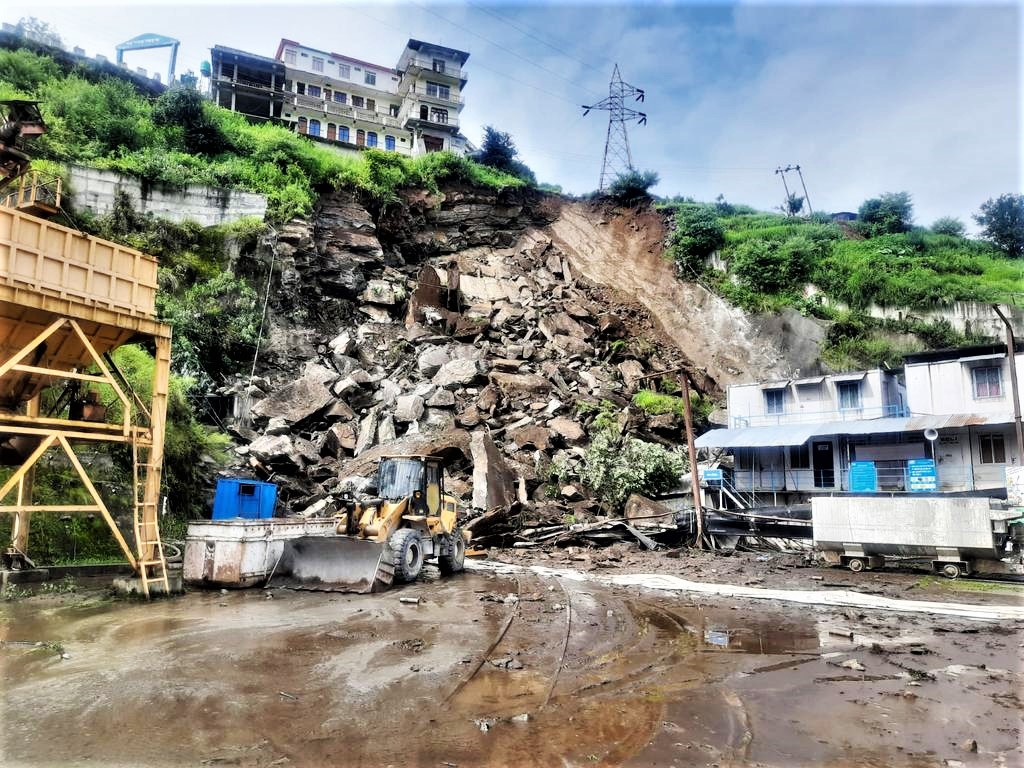30 July 2021
Tapovan Vishnugad – another landslide at the hydroelectric scheme in northern India
Posted by Dave Petley
Tapovan Vishnugad – another landslide at the hydroelectric scheme in northern India
The Tapovan Vishnugad run of the river hydroelectric scheme in Uttarakhand in northern India was devastated by the disastrous debris flow that resulted from the Chamoli rock slope failure in February of this year. Many of those killed lost their lives in tunnels under construction as part of the project.
Inevitably the news has shifted to other priorities, but for those living in the area the turmoil continues. One of the villages most heavily affected by the debris flow was Raini, which is famous as the birthplace of the Chipko Movement in 1973, which according to Britannica was a “nonviolent social and ecological movement by rural villagers, particularly women, in India in the 1970s, aimed at protecting trees and forests slated for government-backed logging”.
On 17 and 18 June 2021 Raini was affected by devastating floods, which destroyed the lower part of the village.
And then on 24 July 2021 a further substantial landslide occurred at the Tapovan Vishnugad hydroelectric scheme. Science the Wire has an article that highlights this event, which includes the following image:-

The 24 July 2021 landslide at the Tapovan Vishnugad hydroelectric scheme in Uttarakhand, India. Image from Science the Wire.
.
The news reports suggest that this was a collapse at the site of the tunnel portal near to Selang village. The image would seem to support that interpretation – note the tracks leading into the slope. The failure appears to be a rockslide; the tabular form of the blocks and the inclination of the beds in the scar suggest that this is likely to be a discontinuity controlled planar failure.
Whilst this is unlikely to be terminal for the Tapovan Vishnugad project, it will be expensive to repair and it undoubtedly raises further questions about the ability of the project team to understand and manage the geotechnical hazards.
Ironically, this week five individuals, three of whom are from Raini, petitioned the Uttarakhand high court, seeking (in the words of the Science the Wire article) “revocation of the projects’ forest and environmental clearances, and eventual cancellation of the two hydropower projects.
“In their public interest litigation (PIL), the petitioners claimed that the use of explosives during project construction had weakened the already fragile hills, thereby increasing the frequency and intensity of landslips in the region. The current situation is such that for safety, the villagers from Raini sometimes take shelter in nearby forests. Considering this, the need for rehabilitation of the villagers was raised in the PIL.”
On the first day of the hearing, the court dismissed the petition and, outrageously, fined each of the petitioners 10,000 rupees (about £96).


 Dave Petley is the Vice-Chancellor of the University of Hull in the United Kingdom. His blog provides commentary and analysis of landslide events occurring worldwide, including the landslides themselves, latest research, and conferences and meetings.
Dave Petley is the Vice-Chancellor of the University of Hull in the United Kingdom. His blog provides commentary and analysis of landslide events occurring worldwide, including the landslides themselves, latest research, and conferences and meetings.
I wonder what the backstory on the fines is………. “Don’t mess with Modhi” perhaps?
Dear Dave, thank you for sharing the information. I assume you are also assessing the causes of theses landslides in the mountains – whether they are natural or man-made. I suspect many of these landslides could be human-induced – be they directly slope destabilization OR the impacts of the current anthropogenic climate change. That would be interesting.
Might be of interest Pete.
https://www.msn.com/en-gb/news/uknews/mudslides-force-dozens-of-motorists-to-spend-night-on-motorway-and-in-tunnel/ar-AAML5ZR?ocid=msedgntp
How can a private citizen in a OECD nation make a donation to help the villagers?
Use of explosives does not rupture the ground including houses. Wadia Institute of Himalayan Geology Dehradun has done this experiment.